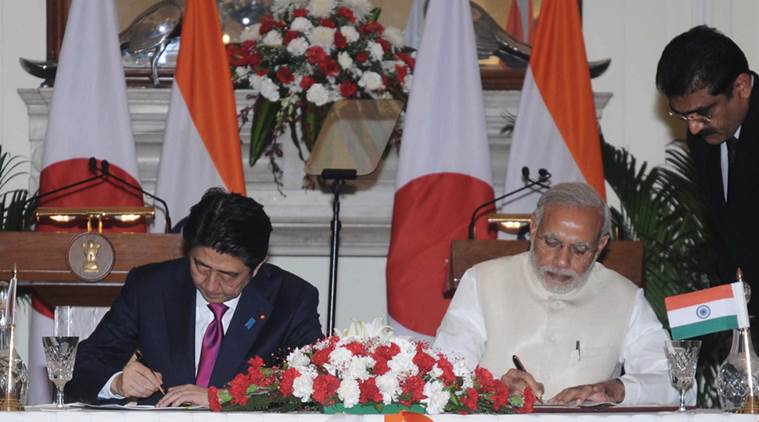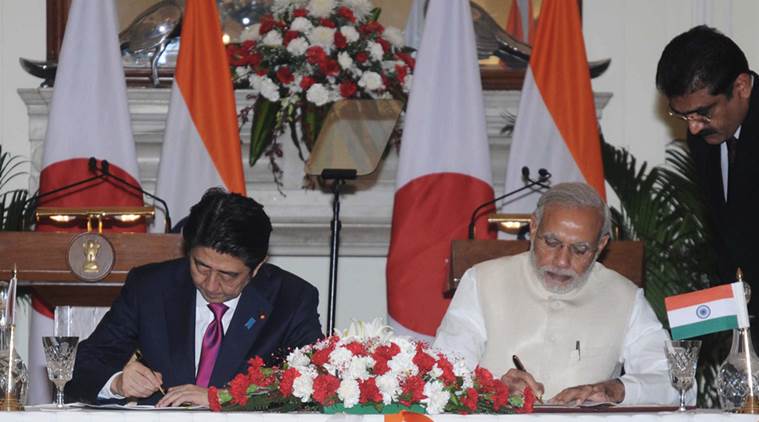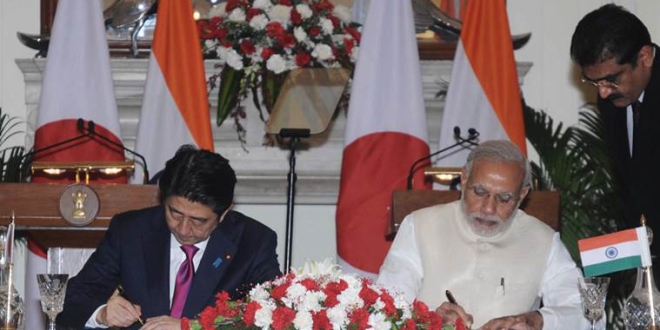
 The Prime Minister, Shri Narendra Modi and the Prime Minister of Japan, Mr. Shinzo Abe at the signing ceremony, in New Delhi on December 12, 2015.
The Prime Minister, Shri Narendra Modi and the Prime Minister of Japan, Mr. Shinzo Abe at the signing ceremony, in New Delhi on December 12, 2015.
In as much as it built on Prime Minister Narendra Modi’s trip to Japan last year and their meetings thereafter, Japanese Prime Minister Shinzo Abe’s much-anticipated return visit has put the bilateral relationship in perspective. Modi, whose personal chemistry with Abe has been making news since last August, has been successful in making Japan India’s most important partner for development. The PM’s statement that “No friend will matter more in realising India’s economic dreams than Japan” must be read in the context of the special focus on infrastructure development in the partnership, including the high-speed railway to be built on the Shinkansen model between Mumbai and Ahmedabad, for which Abe has provided a package of $12 billion and technical assistance on easy terms. The broad agenda that had been laid out in the Modi-Abe meeting in Tokyo last year appears to have taken several steps towards realisation.
The centrepiece is the breakthrough civil nuclear cooperation agreement that India and Japan have signed after a half-decade of negotiations. The nuclear deal, which will facilitate the building of nuclear power plants in India with Japanese reactors and also ease nuclear commerce with the West — given Japan’s stakes in US firms like General Electric and Westinghouse as well as France’s Areva — is also politically symbolic. It has been worked out despite the entrenched opposition and misgivings in Japan vis-a-vis nuclear trade with a non-NPT nuclear-weapons state like India. Abe and Modi had liberated the bilateral relationship from this thorny issue last year, but its resolution now removes a longstanding impediment and it has implications for more than mere commerce and clean energy. It, indeed, reflects “a new level of mutual confidence and strategic partnership”. That burgeoning strategic partnership can also be seen in the enabling agreements on defence and regional cooperation. New Delhi and Tokyo have signed a deal on defence equipment transfer and technological cooperation, as well as a pact on security measures to protect military information. Japan will also, henceforth, regularly participate in the India-US Malabar exercises.
The India-Japan partnership cannot, however, be explored without reference to the China factor. The fact that the two sides made an unequivocal mention of the South China Sea — calling for all nations to “avoid unilateral actions” — in their joint statement, for the first time, will resonate across the region. While the world does not see China’s major investments in Pakistan, including the economic corridor, in anti-India terms, it is undeniable that China’s rise is reordering the Asian balance of power. Japan and India are both adapting to that fact and trying to improve their individual prospects through a deeper strategic collaboration.
![]()
Source: New feed






